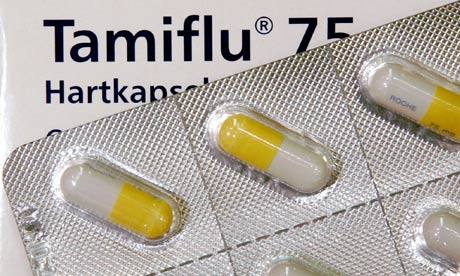Roche Agrees to Release all Tamiflu Data
After a long battle, Swiss drugmaker Roche Holding AG has agreed to release all of its Tamiflu trial data to the Cochrane Collaboration, a health research body.

Tamiflu is an influenza vaccine that has been approved by regulators worldwide and stockpiled by governments in case of a global flu pandemic; sales of the drug reached nearly $3 billion in 2009 due to the H1N1 swine flu outbreak. However, scientists have questioned whether the drug works, and Roche had been the subject of an intensifying campaign over its refusal to release clinical trial data on Tamiflu to independent researchers like Cochrane. The company has now said in an email to Cochrane that it would provide clinical study reports on all the 74 studies into its medicine in the next few months.
Cochrane has welcomed this week’s announcement by Roche, yet it also yet it also expressed concern that the data might be edited in a way that would make analysis and interpretation more difficult, after hearing that Roche would redact some of the data to “ensure patient confidentiality and to protect legitimate commercial interests.” Other campaigners felt that Roche had wasted time by failing to release trial data until now - Sile Lane, director of campaigns at Sense about Science, said that “it shouldn't have taken the researchers years of persistence and publicity to get these Tamiflu results.”
The campaign from Cochrane started in 2009 after Roche only gave the group access to one part in a series of ten Tamiflu trials, telling them that ““you have all the detail you need to undertake a review and so we have decided not to supply any more detailed information.” Cochrane’s efforts to gain access to Tamiflu data picked up momentum after Ben Goldacre published Bad Pharma, and after the AllTrials campaign was launched in January to put pressure on pharma to release trial data. AllTrials has the backing of notable groups such as NICE, IQWiG, and in February they received a boost when GSK became the first pharma company to agree to publish all of its clinical trial reports and develop an online platform to provide access to randomised patient data. Roche also came under fire from British MPs, who called for a Commons committee to examine whether the company should give back the £500 million the British government spent on stockpiling Tamiflu, based on allegations that the drug was no more effective than a placebo.
Following this week’s declaration, a Roche spokesperson commented to PMLiVE that “by amending and executing the data transparency policy Roche has taken a leading role in improving access to clinical trial data for third party researchers. We understand and support calls for our industry to be more transparent about clinical trial data with the aim of meeting the best interests of patients and medicine.” As well as agreeing to release trial data to Cochrane, Roche has set up the Multi-Party Group for Advice on Science (MUGAS), an “independent body of recognized experts” that will review the published data, inviting Cochrane to join. However, Cochrane has not yet accepted the invitation, noting that three out of four of these key ‘independent’ consultants had previously worked for Roche. Albert Osterhaus, a scientific advisor to Roche and a key consultant for MUGAS, called for the partners of MUGAS to “stop wasting precious energy on this pointless discussion about scientific integrity and instead engage in a constructive collaboration to address urgent health issues.”
